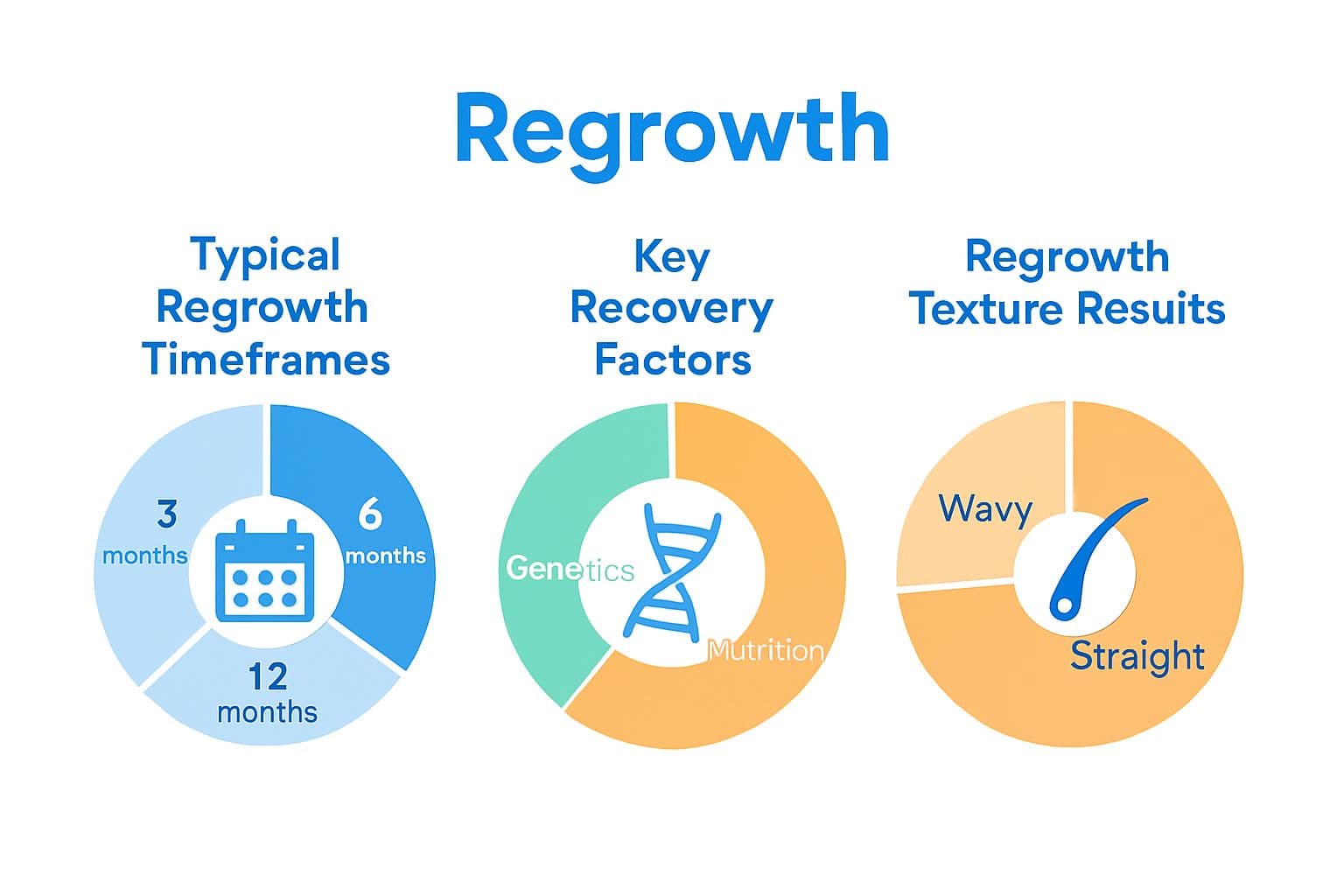Blog
Learning Materials
Understanding Hair Growth After Chemo: What to Expect
Updated: October 11, 2025

Chemotherapy is known for its powerful effects on cancer but it also brings dramatic changes to your hair that catch many by surprise. Around 65 percent of patients experience hair loss within just two to four weeks of treatment and that statistic alone can feel overwhelming. Yet most people do not realize that hair follicles often begin to recover almost immediately once chemo ends making regrowth possible far sooner than most expect.
Table of Contents
- What Happens To Hair During Chemotherapy?
- The Science Of Hair Regrowth After Treatment
- Factors Influencing The Rate Of Hair Growth After Chemo
- Emotional Impact Of Hair Loss And Regrowth
- Personalized Hair Care Strategies Post-Chemotherapy
Quick Summary
| Takeaway | Explanation |
|---|---|
| Chemotherapy disrupts hair growth cycles. | Chemotherapy targets rapid cell division, affecting both cancer and hair follicle cells, leading to hair loss. |
| Hair regrowth typically begins 3-6 months post-treatment. | Most patients notice the return of hair within this timeframe, often with different texture or color initially. |
| Nutrition plays a vital role in hair restoration. | Proper intake of protein, iron, vitamins, and minerals supports hair regrowth and overall follicle health during recovery. |
| Emotional support is crucial during hair loss. | Coping mechanisms, such as support groups and self-compassion, can help patients manage anxiety and feelings of vulnerability. |
| Gentle hair care is essential post-chemotherapy. | New hair is fragile and requires minimal handling, moisture maintenance, and protective hair care products for optimal recovery. |
What Happens to Hair During Chemotherapy?
Chemotherapy represents a complex medical treatment that dramatically impacts hair follicles and overall hair growth processes. Understanding how these powerful drugs interact with your body helps patients prepare for and navigate potential hair loss experiences more effectively.
The Cellular Impact of Chemotherapy Drugs
Chemotherapy drugs are designed to target rapidly dividing cells in the body, which unfortunately includes not only cancer cells but also healthy cells found in hair follicles. According to the National Cancer Institute, these medications disrupt the normal hair growth cycle by attacking cells responsible for hair production.
The hair loss process typically occurs through several key mechanisms:
- Disruption of hair follicle stem cells
- Interruption of cellular division in hair roots
- Weakening of protein structures within hair strands
Stages of Chemotherapy Related Hair Loss
Hair loss during chemotherapy is not instantaneous but follows a predictable progression. Most patients begin experiencing noticeable hair thinning approximately two to four weeks after starting treatment. The extent and pattern of hair loss can vary significantly depending on the specific chemotherapy drugs used, dosage, and individual physiological responses.
Key Factors Influencing Hair Loss:
- Type of chemotherapy medication
- Dosage and frequency of treatment
- Individual genetic predispositions
- Overall health and nutritional status
Understanding Hair Follicle Damage
The damage caused by chemotherapy to hair follicles is often temporary. Most patients will experience hair regrowth after completing their treatment cycle, though the texture and color might initially differ from their original hair. [MyHair.ai offers personalized insights into hair recovery after medical treatments], helping patients understand and support their hair restoration journey.
While the process can be emotionally challenging, understanding the scientific mechanisms behind chemotherapy induced hair loss can help patients approach this side effect with greater knowledge and resilience.
The Science of Hair Regrowth After Treatment
Hair regrowth after chemotherapy is a complex biological process involving multiple physiological mechanisms. Understanding how hair restoration occurs helps patients set realistic expectations and approach their recovery with informed optimism.
Biological Mechanisms of Hair Regeneration
The hair follicle contains remarkable regenerative capabilities that enable recovery after chemotherapy treatment. According to Cancer.Net, hair follicle stem cells remain largely intact during treatment, which supports future hair regeneration.
Cellular Recovery Processes:
- Reactivation of dormant hair follicle stem cells
- Restoration of normal cellular division patterns
- Gradual reconstruction of protein structures within hair roots
Timeline and Variability of Hair Regrowth
Hair regrowth is not uniform and varies significantly among individuals. Most patients observe initial hair regrowth within 3 to 6 months after completing chemotherapy. The emerging hair might initially appear different from pre-treatment characteristics, presenting unique textural or color variations.
Factors Influencing Regrowth Speed:
- Individual metabolic rates
- Overall nutritional status
- Specific chemotherapy drug combinations
- Personal genetic predispositions
Supporting Healthy Hair Restoration
Proper nutritional support and gentle hair care can significantly enhance the regrowth process. Explore our comprehensive guide on hair recovery to understand how targeted interventions can optimize your hair restoration journey. Patients should focus on maintaining overall health, consuming protein-rich diets, and using mild hair care products during this delicate regeneration phase.
While the hair regrowth process can seem unpredictable, understanding the underlying scientific principles provides patients with valuable insights and hope for complete hair restoration.
Factors Influencing the Rate of Hair Growth After Chemo
Hair regrowth following chemotherapy is not a linear process but a complex interplay of biological, personal, and environmental factors. Understanding these nuanced influences empowers patients to optimize their hair restoration journey with realistic expectations and proactive strategies.
Individual Biological Determinants
Genetic makeup and individual physiological responses play a crucial role in determining hair regrowth speed and quality. According to MD Anderson Cancer Center, some patients experience significantly faster hair regeneration based on inherent genetic predispositions.
Key Biological Factors:
- Genetic hair growth patterns
- Overall metabolic efficiency
- Immune system recovery rate
- Hormonal balance during treatment
Nutritional and Health Considerations
Nutritional status and overall health significantly impact hair follicle regeneration. Patients with robust nutritional profiles and balanced health tend to experience more consistent and faster hair regrowth. Essential nutrients like protein, iron, and vitamins play critical roles in supporting cellular regeneration and hair protein synthesis.
Critical Nutritional Elements:
- Protein intake for keratin production
- Iron levels supporting cellular metabolism
- Vitamin D and B complex for follicle health
- Zinc and selenium for cellular repair
Treatment and Environmental Influences
The specific chemotherapy protocol, treatment duration, and environmental conditions can substantially affect hair restoration timelines. Learn more about advanced hair recovery techniques that can potentially accelerate and support the regrowth process. Factors such as radiation exposure, overall treatment intensity, and individual stress levels contribute to the complexity of hair regeneration.
While individual experiences vary, understanding these interconnected factors provides patients with a comprehensive perspective on their unique hair restoration journey.
The following table summarizes the critical biological, nutritional, and treatment-related factors that influence the rate and quality of hair regrowth after chemotherapy.
| Factor Category | Specific Factors | Role in Hair Regrowth |
|---|---|---|
| Biological Determinants | Genetics, metabolic efficiency, immune recovery, hormones | Determine individual regrowth speed, thickness, and overall results |
| Nutritional Considerations | Protein, iron, vitamins (D, B complex), zinc, selenium | Support follicle recovery, keratin production, and scalp health |
| Treatment & Environmental | Chemotherapy type/dose, radiation, treatment intensity, stress | Affect timeline, consistency, and interruption of regrowth process |

Emotional Impact of Hair Loss and Regrowth
Hair loss during chemotherapy transcends physical changes, representing a profound emotional journey that challenges patients' self perception and psychological resilience. Understanding the complex emotional landscape helps patients develop healthy coping mechanisms and maintain positive mental health throughout treatment and recovery.
Psychological Dimensions of Hair Loss
The experience of losing hair often triggers intense emotional responses that extend far beyond aesthetic concerns. According to American Cancer Society, hair loss can symbolize a visible marker of illness, dramatically impacting personal identity and emotional well being.
Common Emotional Responses:
- Feelings of vulnerability and loss of control
- Grief associated with physical transformation
- Anxiety about personal appearance
- Decreased self confidence
Psychological Resilience and Adaptation
Patients develop remarkable psychological strategies to navigate hair loss, transforming potential distress into opportunities for personal growth. Emotional support systems, including family, friends, and professional counseling, play crucial roles in helping individuals process and reframe their experiences.
Effective Coping Strategies:
- Embracing alternative appearance options
- Connecting with support groups
- Practicing self compassion
- Developing positive reframing techniques
Emotional Recovery and Self Acceptance
Regrowth represents more than physical hair restoration it symbolizes healing and resilience. Explore supportive hair restoration techniques that can help patients rebuild confidence during their recovery journey. The emotional transformation parallels physical healing, with many patients reporting increased self awareness and personal strength.
Recognizing hair loss as a temporary challenge rather than a permanent condition empowers patients to maintain hope and emotional equilibrium throughout their treatment and recovery process.
This table organizes common emotional responses to hair loss during chemotherapy alongside key coping strategies that promote psychological resilience and adaptation.
| Emotional Response | Description | Coping Strategy | Example Technique |
|---|---|---|---|
| Vulnerability & Loss of Control | Feeling exposed, powerless | Emotional support & connection | Joining support groups |
| Grief over Physical Transformation | Grieving change in appearance | Positive reframing | Embracing alternative styles |
| Anxiety about Appearance | Worry about others' perception | Self-compassion practices | Practicing self-affirmations |
| Decreased Self-Confidence | Lowered sense of self-worth | Professional counseling/support | Speaking to a counselor |
Personalized Hair Care Strategies Post-Chemotherapy
Recovering hair after chemotherapy requires a thoughtful, individualized approach that recognizes the unique vulnerabilities of post treatment hair follicles. Developing a comprehensive care strategy helps patients nurture delicate new hair growth and rebuild their confidence during the restoration process.
Understanding Fragile Hair Dynamics
Post chemotherapy hair requires exceptionally gentle handling to support healthy regeneration. According to the National Cancer Institute, new hair strands are significantly more delicate and prone to damage compared to pre treatment hair, necessitating specialized care techniques.
Critical Considerations for Fragile Hair:
- Minimal mechanical manipulation
- Reduced thermal styling exposure
- Protection from environmental stressors
- Consistent moisture maintenance
Nutrition and Topical Support Strategies
Nutritional interventions and targeted hair care products play crucial roles in supporting robust hair regeneration. Patients should focus on protein rich diets, essential micronutrients, and specialized hair treatments designed for sensitive scalp conditions. Scalp health becomes paramount in creating an optimal environment for hair follicle recovery.
Essential Nutritional and Topical Elements:
- Protein supplements for keratin production
- Scalp friendly moisturizing treatments
- Micronutrient rich dietary supplements
- Gentle botanical hair strengthening products
Monitoring and Adaptive Care Approaches
Successful hair restoration demands continuous assessment and flexibility. Explore comprehensive hair recovery techniques that can help patients track and optimize their unique hair restoration journey. Regular consultations with healthcare professionals and tracking individual hair growth patterns enable patients to adjust their care strategies dynamically.

Embracing a patient centered, holistic approach to hair care transforms the post chemotherapy experience from a challenging transition to an empowering journey of renewal and resilience.
Support Your Hair Regrowth Journey with Personalized Insights from MyHair.ai
Losing hair during chemotherapy can feel overwhelming, and regrowing it after treatment comes with its own set of worries. You just read about how hair follicles recover and how unique each hair regrowth journey can be. Concerns like unpredictable recovery speed, fragile new hair, and the need for gentle care are real. Understanding what is happening with your hair is the first step to feeling confident as it returns. MyHair.ai offers exactly what you need to move forward with assurance. Our platform provides AI-based analysis so you can track the health of your new growth and access easy-to-understand recommendations tailored to your individual experience. Use our personalized hair health analysis tools to get answers specific to your journey and see meaningful improvement.

Ready to take charge of your hair comeback story? Start with a simple scan and let MyHair.ai guide you. Get tailored support and see real progress with our user-friendly approach. Visit MyHair.ai now to begin your personalized recovery plan. Looking for tips on gentle care and product support after chemo? Check our trusted hair recovery strategies and insights into healthy hair regrowth. Now is the time to nurture your hair the right way.
Frequently Asked Questions
What can I expect during the hair loss process after starting chemotherapy?
Most patients experience noticeable hair thinning about two to four weeks after starting chemotherapy. Prepare for this by considering options like wigs or hats to help you feel more comfortable during this transition.
How long does it typically take for hair to start growing back after chemotherapy?
Hair regrowth usually begins within 3 to 6 months after completing chemotherapy treatment. Keep an eye on your hair growth during this period to identify any patterns or changes in texture and color.
What factors influence the rate of hair growth after chemotherapy?
The speed of hair regrowth can be affected by individual genetics, overall health, and nutritional status. Focusing on a balanced diet rich in protein and essential vitamins can support your recovery process.
Are there specific hair care techniques I should follow to promote healthy regrowth after chemotherapy?
Yes, post-chemotherapy hair is fragile and requires gentle handling. Minimize mechanical manipulation and avoid using heat styling tools to help support your new hair growth.
How can I emotionally cope with hair loss during and after chemotherapy?
Acknowledging your feelings is crucial as hair loss can impact your self-esteem. Consider joining a support group or speaking with a mental health professional to help navigate this emotional journey.
What nutritional support should I focus on for optimal hair regrowth after chemo?
Focusing on a diet rich in protein, iron, and vitamins can enhance hair recovery. Incorporate protein-rich foods and consider adding micronutrient supplements to support your hair's health and regrowth process.